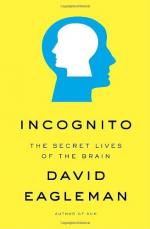
|
| Name: _________________________ | Period: ___________________ |
This test consists of 5 short answer questions, 10 short essay questions, and 1 (of 3) essay topics.
Short Answer Questions
1. By what are thoughts underpinned?
2. How far in the past do we actually "live"?
3. What have we humans thrown ourselves into deciphering?
4. What does Eagleman say can get in the way of our efficiency?
5. What does Eagleman say seeing is?
Short Essay Questions
1. What does Eagleman describe in the opening chapter?
2. Who is Mike May and what happens to him?
3. What ways can our vision be fooled?
4. Why is it an advantage to be able to do things without the use of the conscious mind?
5. How does Eagleman offer an analogy of one's awareness to a newspaper headline?
6. What has given greater insight into the workings of the mind since Freud's time?
7. What is one example Eagleman gives of how one reacts to something before the person is even aware of the situation?
8. What has to shift in order to fully appreciate the small role of the unconscious and to what does Eagleman compare that shift?
9. What is another illustration of how one reacts to something before the person is even aware of the situation?
10. What does Eagleman say about the auditory sense?
Essay Topics
Write an essay for ONE of the following topics:
Essay Topic 1
Titles often play a vital role in making a person decide to read a particular book. Discuss the following:
1. Fully explain why you think Incognito is titled as such. Do you think it is the best title for the book? Why or why not? Can you think of a better title? Why would you choose it?
2. How important is a title in influencing you to consider reading a book? Explain your answer.
3. Do you think a title needs to have direct relevance to a book's content? Explain your answer.
4. Have you ever read a book that when you finished, you do not understand the relevance of the title? Does it discourage you from "trusting" that particular author again?
Essay Topic 2
Eagleman in writing about Mel Gibson cites anti-Semitism was demonstrated by Gibson. Discuss one of the following:
1. Define anti-Semitism and give examples of it from both Incognito and other sources.
2. Do you think anti-Semitism still exists in the United States? Explain.
3. Discuss the idea put forth by Eagleman that Mel Gibson may have two brains, one not prejudice and one that is. Use examples from Incognito to support your answer.
Essay Topic 3
There are a number of interesting questions raised by Incognito. Questions that Eagleman most likely want readers to consider and think through carefully. Discuss the following:
1. What does the term "author agenda" mean?
2. Name one idea/concept you think may have been a part of the Eagleman's agenda. Analyze that idea throughout the book and discuss Wilson's probable agenda concerning that idea.
2. Do you think writers who have an agenda for writing should point it out in a preface?
3. How often do you think fiction is written with a clear agenda in mind by the author?
4. Research the life of Eagleman and see if/where his life may have influenced his writing.
|
This section contains 1,076 words (approx. 4 pages at 300 words per page) |

|




